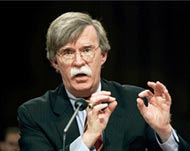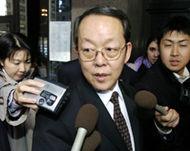UN gives Iran 30 days to comply
The UN Security Council has given Iran 30 days to abandon its uranium enrichment activities without mentioning steps it might take if Tehran fails to comply.

The meeting of the 15-nation council took place on Wednesday shortly after the five permanent council members, the United States, Britain, Russia, China and France, agreed on a statement after three weeks of negotiations.
The statement calls on Mohamed ElBaradei, director general of the International Atomic Energy Agency (IAEA), the UN watchdog in Vienna, to report back on Iran’s compliance within 30 days.
The US hailed it as a breakthrough in efforts to block Iran’s drive to become a nuclear power.
Sanctions not ruled out
John Bolton, the US ambassador to the UN, said: “This is an unambiguous signal to Tehran that the Security Council of the United Nations, charged with the maintenance of international peace and security under the charter, is now dealing with this issue.
“It sends an unmistakable message to Iran that its efforts to deny the obvious fact of what it is doing are not going to be sufficient.”
The West has refused to rule out sanctions if Iran does not comply and US officials have said that military action was an option, although Britain has disavowed it.
The statement, which needed the approval of all 15 council members, was read at a public meeting by Cesar Mayoral, Argentine ambassador and this month’s council president.
Concessions
The text made significant concessions to Russia and China, which were anxious to avoid language that might later be used to press for sanctions against Iran, should it remain defiant.
 |
|
John Bolton: Clear message that |
Co-sponsors Britain and France had originally sought a report from ElBaradei on “Iranian compliance with the steps required by the IAEA board” in 14 days.
The statement is non-binding, but Condoleezza Rice, the US secretary of state, said it “demonstrates that the international community is united in its concern over Iran’s nuclear programme”, which Washington says hides an attempt to develop an atomic bomb.
But Wang Guangya, China’s ambassador to the UN, said the statement was a strong message for the council to support the authority of the IAEA.
Iran restarted its nuclear enrichment programme earlier this year but says its aim is to develop nuclear energy rather than weapons.
Strategy meeting
Foreign ministers of the five powers and Germany meet in Berlin on Thursday to map out strategy on Iran and council members raced to finish the statement before then.
 |
|
China’s Wang Guangya: Statement |
Western ambassadors said the five nations reached agreement only after a provision stating that the council was responsible for international peace and security was removed at Russia’s insistence.
Russia and China both feared such a statement could later be used as a legal basis for sanctions or a military strike against Iran.
Bolton criticised Russia and China for deleting that paragraph, saying it was a direct quotation from the UN charter.
“We accept that they don’t want to quote from the UN charter, because the message is clear none the less that Iran’s nuclear weapons programme is unacceptable,” he said.
He said that while the statement “may not win any awards in tennis heaven, the ball is back in Iran’s court, and we’ll be here in 30 days to see what they will do”.
The IAEA reported the Iranian issue to the council on March 8 after Tehran resumed nuclear fuel work. This prompted European negotiators – Germany, France and Britain – to break off two-and-a-half years of negotiations.